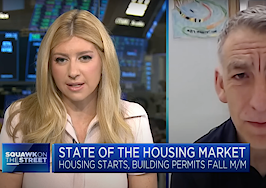Inman Connect is LIVE Aug. 8-10! Join us for impactful interviews, cutting-edge conversations and networking with thousands of real estate pros. Get valuable takeaways to thrive in a rapidly shifting market. Can’t come to Vegas? Register now for a virtual ticket.
With elevated mortgage rates keeping both homebuyers and sellers on the fence, real estate agents are turning to mortgage loan officers to widen their funnel and discover options that can get their clients to the closing table.
That’s the perspective of Zillow Senior Economist Orphe Divounguy and Rocket Mortgage President Tim Birkmeier, who provided a tactical breakdown Wednesday at Inman Connect Las Vegas on how to negotiate the dual obstacles of high home prices and mortgage rates.
Mortgage loan officers can help real estate agents show many homebuyers that they have more options than they think, and overcome the reservations of would-be sellers who feel locked in by the low rate on their current mortgage.

Orphe Divounguy
“You have buyers who absolutely can’t afford it, but for many people who can afford it, some of them don’t even know that they can,” Divounguy said. “You know, research says that one in four first-time homebuyers doesn’t even know how much they need for downpayment or for closings. And so there’s a knowledge gap, right?”
Divounguy pointed out two ways Zillow can help would-be homebuyers broaden their perspective.
Through a partnership with Down Payment Resource, an Atlanta-based company that tracks down payment assistance programs, homebuyers searching for homes on the listing portal can enter some basic information to find out about assistance programs they may be eligible for.
“Instead of navigating through a myriad of government websites, we basically assemble all of the local downpayment assistance programs on every single listing,” Divounguy said.
One year after launching the program at the end of 2021, Zillow revealed 1 million users had queried the Down Payment Resource database, which tracks programs available in all 3,143 U.S. counties.
In April, Zillow unveiled a new tool that lets house hunters search for homes according to the monthly mortgage payment they can afford, instead of just listing prices.
“Your buyers can now put in what they want to spend on a monthly basis, and all of the inventory that will fit within their budget will show up, to make the agent’s life a lot easier,” Divounguy said.

Clelia Peters | Era Ventures
That hit home for panel moderator Clelia Peters, managing partner of Era Ventures, who said her father — a real estate agent and brokerage owner — “always said at the end of the day, this is a monthly cost business. ”
Birkmeier agreed that buyers are counting on real estate agents “to step up in a big way” and help them navigate through the market.
“I also think you’re gonna get a lot of creativity and I think you’re starting to see some new mortgage programs show up,” he said.
In April, Rocket announced it would offer homebuyers a closing credit of up to $10,000 if they work with a real estate agent that’s partnered with sister company Rocket Homes. Emerson said the BUY+ program “has resonated strongly with first-time homebuyers, home sellers and real estate agents.”
A collaboration between Rocket Mortgage and Rocket Homes, Rocket’s home search platform and real estate agent referral network, the BUY+ program “has far surpassed” initial expectations, the company said in reporting second quarter earnings on Aug. 4.
In May, Rocket rolled out ONE+, a new 1 percent down mortgage targeted at low- to moderate-income homebuyers that also picks up the tab for private mortgage insurance.
But it’s not just buyers struggling with elevated mortgage rates. Another constraint on home sales is the “lock-in effect,” or the reluctance of existing homeowners to part with the low rate on their current mortgage.
Divounguy pointed to Freddie Mac research suggesting that the average value of the lock-in effect is $55,000 per home, ranging from a low of $32,000 in West Virginia to a high of $91,000 in Hawaii.
“In today’s environment where homes are moving so rapidly in most markets, sellers can command a very high price,” Divounguy said. “I think existing homeowners should borrow a page from builders. They’re not lowering their price. They’re just providing added incentives to close the deal to make the math work for potential homeowners.”
Builders are “setting a price and then they’re providing incentives” like 2-1 buydowns, which reduce the borrower’s mortgage rate by 2 percent the first year and 1 percent the second year, he said. Many existing homeowners are flush with equity and can do the same.
“They can set the price a little bit higher, a price that’s comfortable for them, and then offer incentives — help with closing costs is another thing,” Divounguy said.
With pent-up demand among millennials and first-time homebuyers building, Birkmeier agreed that education is key. But real estate agents should also be prepared to work with buyers for longer to get them to the closing table.

Tim Birkmeier
“It is about education, and I think the buying cycle is longer,” Birkmeier said. “So it is about working with people who you might not have considered in the past. Their credit might not be there, they might not have the money now, or might not have had it in the past.”
Real estate agents need to put in time expanding their funnel and working with lenders and trusted brokers “that can help you keep that prospective buyer warm over an extended period of time,” he said.
“I think you’re gonna have to go wider with your funnel,” Birkmeier said. “And when you do, you’ll enjoy the ride back up. It will happen.”
Get Inman’s Mortgage Brief Newsletter delivered right to your inbox. A weekly roundup of all the biggest news in the world of mortgages and closings delivered every Wednesday. Click here to subscribe.












